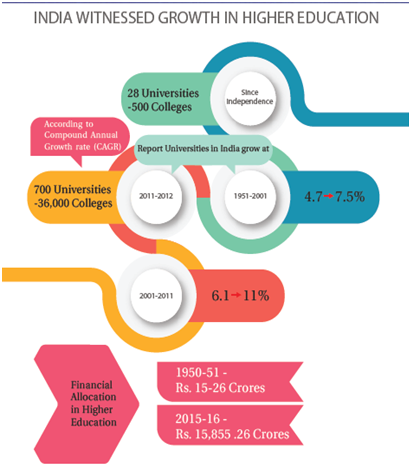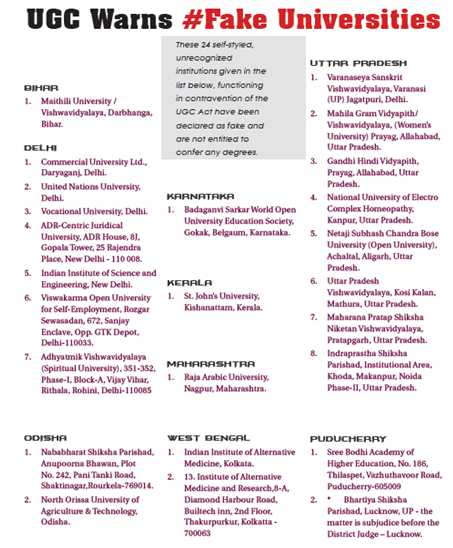
India the largest demographic dividend in the field of HigherEducation has undergone radical changes. These changes are so much that it has replaced the colonial style of education in which higher education remained within the custody of selected individuals. During the second half of the last century, higher education has gone a rapid change replacing the colonial style of education in which higher education (HE) and knowledge remained within the custody of selected individuals. Today, India is the largest contributor to the global workforce with its workingage population surpassing 950 million. It is no surprise then that, India has emerged to be the world’s third-largest economy – an achievement underpinned by its unique demographic advantage, but also a prospect that would not have translated into reality if not for the country’s pioneering reforms in university education over the past 20 years.
has gone a rapid change replacing the colonial style of education in which higher education (HE) and knowledge remained within the custody of selected individuals. Today, India is the largest contributor to the global workforce with its workingage population surpassing 950 million. It is no surprise then that, India has emerged to be the world’s third-largest economy – an achievement underpinned by its unique demographic advantage, but also a prospect that would not have translated into reality if not for the country’s pioneering reforms in university education over the past 20 years.
The highly motivated drive towards making our world a knowledgeable society worldwide is based on access to information and knowledge; for which higher education is only an indispensable tool. Today, higher education becomes a business and economic hub towards human resource development in India as well as other nations. Higher education in India has witnessed significant growth since independence. A lion share of 70% is invested in research Institution and universities through different ministries and few agencies and rest 30% is contributed by industrial efforts in India. However, the existing scenario of Higher Education in India (HEIs) and Assam in particular in some aspect is facing some challenges in maintaining the quality of higher educational Institution in maintenance.
To mitigate the needs of growing demand of students on higher education, there has been an introduction of the private domain in higher education along with the public institution ultimately leading to commercialization of higher education in India. Such unprecedented mushrooming of a private institution and universities not complying with the rules and regulations laid down by the regulatory body of higher education in India which has resulted into fraudulent activities or academic dishonesty in higher educational Institution offering fake M. Phil and Ph. D Degrees and these issues pose the biggest threat, difficulties and constrain in maintaining the quality of higher educational Institution in India and Assam in particular also is in question.University Grant Commissions (UGC) which we considered as one of the apex regulatory body of higher education is responsible for coordination, determination and maintenance of standards, release of grants. Professional councils such as All India Council for Technical Education (AICTE) and Distance Education Bureau (DEB) are responsible for recognition of courses, promotion of professional institutions and providing grants to undergraduate programmes and various awards. National Assessment and Accreditation Council (NAAC) is an autonomous institution established by the UGC in 1994 to assess and accredit institutions of higher education that volunteer for the process based on prescribed criteria are currently facing sharp criticism on the ground that UGC as a regulatory body of higher education has failed to maintain standard of higher education resulting into the challenges in the maintenance of quality in higher educational institutions today i.e. (issues of academic dishonesty relating to fake Ph. D and M. Phil degrees, backdoor entry into the higher education and producing a fake certificate for seeking job, getting the incremental benefit and in-service promotion etc.) It is becoming a common feeling amongst the masses that the UGC is becoming only grants giving agency in higher education rather than maintaining the quality of Educational Institutions (HEIs). Though the apex regulatory body of higher education i.e. University Grants Commission (U.G.Cs) have enforced different rules and regulations to maintained minimum standard and procedure to offer different degrees and have taken several preventive mechanisms to check academic dishonesty in higher educational Institutions, in a true sense its impact indicates very poor performance. Hence, people have started questioning the existence and functioning of University Grants Commission. Now, the methods of awarding degrees of higher education particularly M. Phil and Ph. D degrees by the various private universities are in question and doubtful about their authenticities and this has become a major threat, difficulties and constrains in the maintenance of quality in higher educational institutions and becoming a subject matter of discussion amongst academicians.
Dr. Kalidas Sarma
To read the further article please get your copy of Eastern Panorama March issue @http://www.magzter.com/IN/Hill-Publications/Eastern-Panorama/News/ or mail to contact @easternpanorama.in

